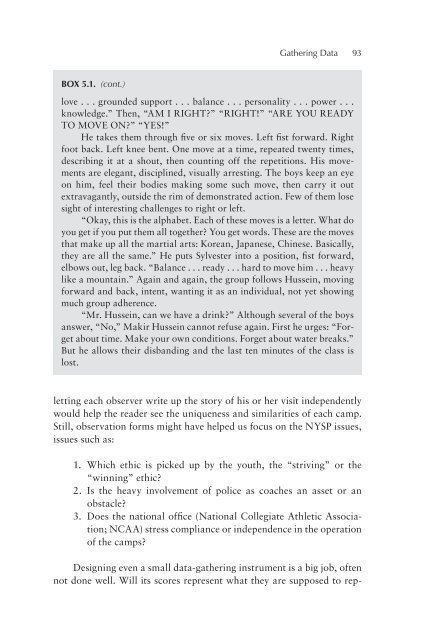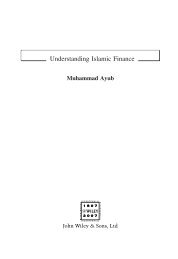How Things Work - Doha Academy of Tertiary Studies
How Things Work - Doha Academy of Tertiary Studies
How Things Work - Doha Academy of Tertiary Studies
You also want an ePaper? Increase the reach of your titles
YUMPU automatically turns print PDFs into web optimized ePapers that Google loves.
BOX 5.1. (cont.)<br />
Gathering Data 93<br />
love . . . grounded support . . . balance . . . personality . . . power . . .<br />
knowledge.” Then, “AM I RIGHT?” “RIGHT!” “ARE YOU READY<br />
TO MOVE ON?” “YES!”<br />
He takes them through five or six moves. Left fist forward. Right<br />
foot back. Left knee bent. One move at a time, repeated twenty times,<br />
describing it at a shout, then counting <strong>of</strong>f the repetitions. His movements<br />
are elegant, disciplined, visually arresting. The boys keep an eye<br />
on him, feel their bodies making some such move, then carry it out<br />
extravagantly, outside the rim <strong>of</strong> demonstrated action. Few <strong>of</strong> them lose<br />
sight <strong>of</strong> interesting challenges to right or left.<br />
“Okay, this is the alphabet. Each <strong>of</strong> these moves is a letter. What do<br />
you get if you put them all together? You get words. These are the moves<br />
that make up all the martial arts: Korean, Japanese, Chinese. Basically,<br />
they are all the same.” He puts Sylvester into a position, fist forward,<br />
elbows out, leg back. “Balance . . . ready . . . hard to move him . . . heavy<br />
like a mountain.” Again and again, the group follows Hussein, moving<br />
forward and back, intent, wanting it as an individual, not yet showing<br />
much group adherence.<br />
“Mr. Hussein, can we have a drink?” Although several <strong>of</strong> the boys<br />
answer, “No,” Makir Hussein cannot refuse again. First he urges: “Forget<br />
about time. Make your own conditions. Forget about water breaks.”<br />
But he allows their disbanding and the last ten minutes <strong>of</strong> the class is<br />
lost.<br />
letting each observer write up the story <strong>of</strong> his or her visit independently<br />
would help the reader see the uniqueness and similarities <strong>of</strong> each camp.<br />
Still, observation forms might have helped us focus on the NYSP issues,<br />
issues such as:<br />
1. Which ethic is picked up by the youth, the “striving” or the<br />
“winning” ethic?<br />
2. Is the heavy involvement <strong>of</strong> police as coaches an asset or an<br />
obstacle?<br />
3. Does the national <strong>of</strong>fice (National Collegiate Athletic Association;<br />
NCAA) stress compliance or independence in the operation<br />
<strong>of</strong> the camps?<br />
Designing even a small data- gathering instrument is a big job, <strong>of</strong>ten<br />
not done well. Will its scores represent what they are supposed to rep

















